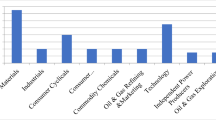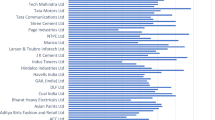Abstract
The last decade has witnessed a rapid growth in the publication of corporate non-financial reports. Variously called the corporate social responsibility, global citizenship or sustainability report, this type of corporate communication provides an uncensored public venue for corporations to demonstrate their commitments toward good corporate citizenship and socially responsible conduct. There is, however, a paucity of research that evaluates the ability of these reports to reach and to positively persuade their intended audiences. This paper examines the notion of corporate reputation in the context of CSR-sustainability reporting, and evaluates the role of senior corporate executive as the spokesperson in engendering public trust and corporate image as a good global citizen.
Similar content being viewed by others
References
Berman, S.J., Abraham, S., Battino, B., Shipnuck, L. and Neus, A. (2007) ‘New business models for the new media world’, Strategy and Leadership, 35 (4), 23–26.
Bragues, G. (2008) ‘The ancients against the moderns: Focusing on the character of corporate leaders’, Journal of Business Ethics, 78, 373–387.
Bream, R. (2006) ‘Digging deep: Mining faces up to the cost of presenting a cleaner image to the world extractive industries’, Financial Times, 17 January, p. 17.
Brickey, K.F. (2008) ‘From boardroom to courtroom to newsroom: The media and the corporate governance scandals’, Journal of Corporation, 33 (3), 625–664.
Casey, N. and McQueen, M.P. (2008) ‘Toy recall revives concerns on magnets’, Wall Street Journal (Eastern Edition), 18 March, p. D5.
Cassidy, J. (2008) ‘Subprime suspect’, The New Yorker, 31 March, pp. 78–91.
Conkey, C. and Zamiska, N. (2007) ‘China to ban lead paint in toys’, Wall Street Journal (Eastern Edition), 12 September, p. B5.
CorporateRegister.com (2008) ‘The corporate climate communications report 2007’, CorporateRegister.com available online at: http://www.corporateregister.com/pdf/CCCReport_07.pdf.
Economist (2007) ‘Business: Plenty to blame to go around; Chinese manufacturing’, The Economist, 384 (8548), 78.
Economist Intelligence Unit (2008) ‘EU regulations: Freer movement of goods', EIU Views Wire, 22 February.
Edmonson, R.G. (2008) ‘Unsafe imports’, Journal of Commerce, 9(11), 24–25.
Eweje, G. (2007) ‘Multinational oil companies’ CSR initiatives in Nigeria; The skepticism of stakeholders in host communities’, Managerial Law, 49 (5/6), 218.
Friedman, M. (1999) Consumer Boycotts: Effective Change through the Marketplace and the Media, Routledge, London.
Hamann, R. and Kapelus, P. (2005) ‘Corporate social responsibility in mining in Southern Africa: Fair accountability or greenwash?’ Development, 47 (3), 85.
Hughes, J. (2007) ‘Sustainability reports seek the cold, hard facts’, Financial Times, 10 December, p. 20.
Human Rights Watch (1999) ‘The price of oil: Corporate responsibility and human rights violations in Nigeria's oil producing communities’, Human Rights Watch, January.
Kaptein, M. and Schwartz, M.S. (2008) ‘The effectiveness of business codes: A critical examination of existing studies and the development of an integrated research model’, Journal of Business Ethics, 77, 111–127.
Kimmitt, R.M. (2008) ‘Public footprints in private markets: Sovereign wealth funds and the world economy’, Foreign Affairs, 87 (1), 119.
KPMG (2005) KPMG International Survey of Corporate Responsibility Reporting 2005, KPMG Global Sustainability Services, available online at: http://www.kpmg.com/nr/rdonlyres/66422f7f-35ad-4256-9bf8-f36facca9164/0/kpmgintlcrsurvey2005.pdf.
Leap, T. (2008) ‘When bad people rise to the top’, MIT Sloan Management Review, 49 (2), 23–27.
Levi, D. and Kocher, S. (1995) ‘The spotted owl controversy and the sustainability of rural communities in the Pacific Northwest’, Environment and Behavior, 27 (5), 631–649.
Locke, R.M. (1995) The Promise and Perils of Globalization: The Case of Nike, MIT the Sloan School of Management's Case Study, MIT Press, Cambridge, MA.
McQueen, P.P. (2008) ‘Senate forgers consumer-safety bill’, Wall Street Journal (Eastern Edition), 16 February, p. A3.
Moberly, R.E. (2006) ‘Sarbanes-Oxley's structural model to encourage corporate whistleblowers’, Brigham Young University Law Review, 5, 1107–1181.
Park, J. (2004) ‘Business and human rights: Mixing profit and principles in the global marketplace’, The Journal of Corporate Citizenship, 13, 24.
Reinstein, A., Moehrle, S.R. and Reynolds-Moehrle, J. (2006) ‘Crime and punishment in the marketplace; Accountants and business executives repeating history’, Managerial Accounting Journal, 21 (3), 420.
Sama, L.M. and Shoaf, V. (2008) ‘Ethical leadership for the professions: Fostering a moral community’, Journal of Business Ethics, 78, 39–46.
Sethi, S.P. (1977) Advocacy Advertising and Large Corporations, D.C. Heath, Lexington, MA.
Sethi, S.P. (2002) ‘Corporate codes of conduct and the success of globalization’, Ethics & International Affairs, 16 (1), 89–106.
Sethi, S.P. (2003) Setting Global Standards: Guidelines for Creating Codes of Conduct for Multinational Corporations, John Wiley and Sons, Inc, New York.
Sethi, S.P. (2005) ‘The effectiveness of industry-based codes in serving public interest: The case of international council on mining and metals’, Transnational Corporations (United Nations Conference on Trade and Development, Geneva, Switzerland, 14 (3), 55–99.
Sethi, S.P. and Emelianova, O. (2006) ‘A failed strategy of using voluntary codes of conduct by the global mining industry’, Corporate Governance: the International Journal of Business and Society, 6 (3), 226–238.
Sethi, S.P, Ferns, W., Emelianova, O. and Lirtzman, S. (2007) ‘Framework for comparing CSR-sustainability reports – Sethi CSR Monitor©’, presented at the 2nd International Conference ‘Globalization and the Good Corporation’, New York, 26–28 June.
Sims, R.R. and Brinkman, J. (2002) ‘Leaders as moral role models: The case of John Gutfreund at Salomon Brothers’, Journal of Business Ethics, 35, 327–339.
Svensson, G. and Wood, G. (2008) ‘A model of business ethics’, Journal of Business Ethics, 77, 303–322.
Surowiecki, J. (2008) ‘Too dumb to fail’, The New Yorker, 31 March, p. 46.
Tench, R., Bowd, R. and Jones, B. (2007) ‘Perceptions and perspectives: Corporate social responsibility and the media’, Journal of Communication Management, 11 (4), 348.
Thomas, T., Schermerhorn, J.R. and Dienhart, J.W. (2004) ‘Strategic leadership of ethical behaviour in business’, Academy of Management Executive, 18 (2), 56–66.
Tsadik, R. (2008) ‘Social networks starting to click’, B to B, 93 (1), 1–2.
Turkeltaub, A. and Bailey, S. (2007) ‘Sakhalin-2 deal will alter business climate’, Oil & Gas Journal, 105 (3), 34–35.
van Schendelen, R. (2002) Machiavelli in Brussels: The Art of Lobbying the EU, Amsterdam University Press, Amsterdam.
Waddock, S., Bodwell, C. and Graves, S. (2002) ‘Responsibility: The new business imperative’, Academy of Management Executive, 16, 132–147.
Weber Shandwick (2007a) ‘Corporate reputation rests on CEO shoulders’, available online at: http://www.chinacsr.com/2007/03/01/1085-corporate-reputation-rests-on-ceo-shoulders/.
Weber Shandwick (2007b) ‘Weber Shandwick's safeguarding reputation’, available online at: http://www.webershandwick.com/Default.aspx/AboutUs/PressReleases/2007/CEOsReceiveNearly60PercentoftheBlameWhenCompanyReputationIsDamaged.
Author information
Authors and Affiliations
Appendix
Rights and permissions
About this article
Cite this article
Ferns, B., Emelianova, O. & Sethi, S. In His Own Words: The Effectiveness of CEO as Spokesperson on CSR-Sustainability Issues – Analysis of Data from the Sethi CSR Monitor©. Corp Reputation Rev 11, 116–129 (2008). https://doi.org/10.1057/crr.2008.11
Published:
Issue Date:
DOI: https://doi.org/10.1057/crr.2008.11




